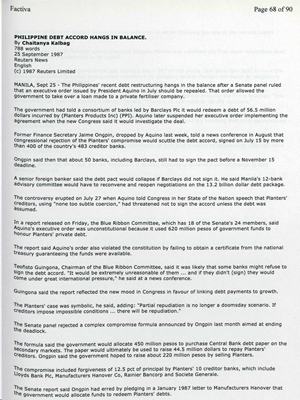PHILIPPINE DEBT ACCORD HANGS IN BALANCE
[Reuters]
Published date: 25th Sep 1987
25 September 1987
Reuters News
English
(c) 1987 Reuters Limited
MANILA, Sept 25 – The Philippines’ recent debt restructuring hangs in the balance after a Senate panel ruled that an executive order issued by President Aquino In July should be repealed. That order allowed the government to take over a loan made to a private fertiliser company.
The government had told a consortium of banks led by Barclays Plc It would redeem a debt of 56.5 million dollars Incurred by (Planters Products Inc) (PPI). Aquino later suspended her executive order implementing the agreement when the new Congress said it would investigate the deal.
Former Finance Secretary Jaime Ongpin, dropped by Aquino last week, told a news conference in August that congressional rejection of the Planters’ compromise would scuttle the debt accord, signed on July 15 by more than 400 of the country’s 483 creditor banks.
Ongpin said then that about 50 banks, including Barclays, still had to sign the pact before a November 15 deadline.
A senior foreign banker said the debt pact would collapse if Barclays did not sign it. He said Manila’s 12-bank advisory committee would have to reconvene and reopen negotiations on the 13.2 billion dollar debt package.
The controversy erupted on July 27 when Aquino told Congress in her State of the Nation speech that Planters creditors, using “none too subtle coercion,” had threatened not to sign the accord unless the debt was assumed.
In a report released on Friday, the Blue Ribbon Committee, which has 18 of the Senate’s 24 members, said Aquino’s executive order was unconstitutional because it used 620 million pesos of government funds to honour Planters’ private debt.
The report said Aquino’s order also violated the constitution by failing to obtain a certificate from the national treasury guaranteeing the funds were available.
Teofisto Guingona, Chairman of the Blue Ribbon Committee, said it was likely that some banks might refuse to Sign the debt accord. “It would be extremely unreasonable of them … and if they didn’t (sign) they would Come under great international pressure,” he said at a news conference.
Guingona said the report reflected the new mood in Congress in favour of linking debt payments to growth.
The Planters’ case was symbolic, he said, adding: “Partial repudiation is no longer a doomsday scenario. If creditors impose impossible conditions … there will be repudiation.”
The Senate panel rejected a complex compromise formula announced by Ongpin last month aimed at ending the deadlock.
The formula said the government would allocate 450 million pesos to purchase Central Bank debt paper on the secondary markets. The paper would ultimately be used to raise 44.5 million dollars to repay Planters’ creditors. Ongpin said the government hoped to raise about 220 million pesos by selling Planters.
The compromise included forgiveness of 12.5 pct of principal by Planters’ 10 creditor banks, which include Lloyds Bank Plc, Manufacturers Hanover Co, Rainier Bancorp and Societe Generale.
The Senate report said Ongpin had erred by pledging in a January 1987 letter to Manufacturers Hanover that the government would allocate funds to redeem Planters’ debts.
It also criticised Ongpin’s attempt to sell Planters for 240 million pesos to a consortium led by Leonides Gonzales, a former executive vice-president of the company, saying offers by other interested buyers were ignored.
From these circumstances, the Committee observes, without implying any dubious motivation, that the settlement of Planters’ (debts) was negotiated with a mind set on finalising the sale to the private buyers headed by Gonzales,” it said.
The report noted that Planters” acting president Marcelo Mirasol was confident the firm could rehabilitate itself if the government contributed to its capital.
It recommended that the government pay Planters about 397 million pesos “and allow (the firm) to have the Same access to the financing arrangement envisioned by (Ongpin) so that Planters can settle its obligations directly with the foreign banks.”
Mirasol said Ongpin had tried to “ram through” the sale of Planters without studying the firm’s finances. “The whole thing has been very poorly handled,” he said. “There is no real need to sell the company.”
Mirasol said the government still owed Planters about 1.6 billion pesos in fertiliser subsidies and compound Interest from 1982. Asked to comment, Ongpin said: “I would rather not say anything that could be construed as controversial.”
The head of another foreign bank’s Manila office said the Blue Ribbon Committee report, taken together with the growing clamour in Congress for a partial repudiation of debt and a ceiling on repayments, was bad news for world markets. “No final shape has emerged, but the Philippines is moving Inexorably towards a radical change in debt strategy,” he said.






